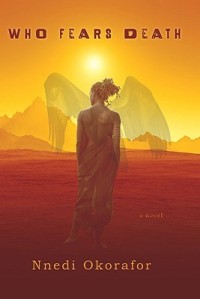 by Nnedi Okorafor, 2010
by Nnedi Okorafor, 2010
I’m in a weird place when it comes to judging this novel. I have never been a fan of fantasy and although I occasionally dabble in what I call “fantasy light” – think Harry Potter or The Lunar Chronicles – I tend to shy away from the harder stuff. When read a fantasy novel came up as a task on the Read Harder Challenge, I thought I would go something along those lines. Then I remembered Who Fears Death appeared as a suggestion for one of last year’s challenge tasks. Billed as both post-apocalyptic and fantasy, I thought I’d hit the jackpot. Well, I’ll tell you outright: I was wrong. I did not enjoy reading this novel. Does that mean it’s bad? I’m not sure.
Who Fears Death is ostensibly a post-apocalyptic tale set in Africa, focusing on the eradication of the Okeke people by the enslaving Nurus. I say “ostensibly” because there is little within the book to actually suggest that an apocalypse has happened – I really only know this because it says so on the book flap. Regardless of this shortcoming, the book is replete with the violence and after-effects of the Nurus’ attempted genocide of the Okeke. Our protagonist Onyesonwu is a direct result of this war – in accordance with the belief that a child born to a Nuru father is Nuru, the Nuru men systematically rape the Okeke women in effort to wipe out the race. Born to one of these raped women and a rapist Nuru sorcerer, Onyesonwu is known as Ewu and is easily identifiable by her lighter colored skin and eyes. Her entire life is subsequently shaped by the circumstances of her birth.
I will hand it to Okorafor that she tackles some rather big and complex subjects in this novel. She doesn’t shy away from including the brutal details of the aforementioned genocidal rape and her discussions of racial disparity, slavery, and female circumcision are equally as candid and palpable. What I found lacking was the way she wrote her character interactions. Through much of the book Onyesonwu is accompanied by Binta, Diti, and Luyu – the three girls who went through the eleventh rite (i.e. circumcision ritual) with her – and Mwita, the fellow Ewu boy who is her obvious romantic intended. In a book that addresses such difficult topics, it is therefore disappointing that the group spends most of their time talking about and having sex. They constantly refer to it as “intercourse,” which I found to be oddly detached, and speak often of their clitorises, berating Onyesonwu for the magical ability to regrow hers so that she, and not they, can enjoy “intercourse.” I’m not one to shy away from sexual talk in books, but the way it’s addressed here felt out of place, as if even in the midst of war and destruction, a girl’s biggest problem will still be who she takes to bed and if she can get off. I’ll be the first to admit my western ignorance on the practice and purpose of female circumcision in Africa, so it would have been great if Okorafor had used the book as opportunity to give readers some insight into that part of the world. Sadly, her characters come off like bickering teenagers who can’t keep it in their pants.
I was similarly unmoved by the “chosen one” narrative of the book. Onyesonwu is the one with the magical ability to defeat the sorcerer who is wreaking destruction amongst the land in accordance with his interpretation of the Great Book – that the fair-skinned Nuru shall rule and the dark-skinned Okeke shall be extinguished. The setup is believable, but I was uninterested in the talk of juju and Onyesonwu’s ability to shapeshift and the many days the group spent trekking to find the evil sorcerer (but mostly talked about “intercourse”). That may be because I’m simply not intrigued by these sorts of tales. I’ve never read Lord of the Rings and I don’t intend to, so it’s possible that someone who does enjoy this type of story may find more to praise in this book than I did. I have a hard time criticizing the book for that reason – it may be a case of “it’s not you, it’s me.” Nevertheless, I don’t think Okorafor did a convincing job of telling this story and I know I won’t be picking up the rest of the books in this series when they’re published. Sometimes some genres just aren’t for you.
[Book Riot Read Harder Challenge: read a fantasy novel.]
Pingback: Challenge Completed! 2017 | The Thousand Book Project
Pingback: 173 Binti | The Thousand Book Project